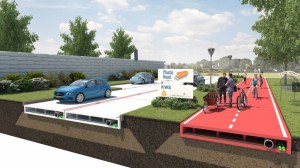
Dutch construction company KWS Infra is preparing to produce roads from recycled plastics, like water and soda bottles.
That plastic soft drink bottle you’ve stuck into your car’s cupholder as you race down the road could see new life as part of the road itself. At least, that’s the idea of a small company in the Netherlands that wants to replace conventional asphalt and concrete with prefabricated roads made out of recycled plastic.
The venture is being taken seriously, at least by the Dutch city of Rotterdam that could use the material in a pilot “street lab” project to see whether it can hold up to the daily grind of traffic. Dubbed PlasticRoad, the materials could last as much as three times longer than conventional pavement and withstand temperatures ranging from -40 to 176 degrees Fahrenheit.
The concept, developed by KWS Infra, part of a Dutch construction and engineering company, claims the PlasticRoad would be particularly “ideal for poorer soil” – such as is often found in the Netherlands – which can quickly cause conventional pavement to break up. The material would also have environmental benefits, KWS Infra claims, among other things eliminating the roadside emissions from laying down new asphalt.
Proponents also note that the roads could be produced out of a variety of different forms of plastic waste. That could include such things as recycled water and soft drink bottles, as well as the enormous amount of plastic waste now swirling around in the oceans.
(Idaho couple raises funds to continue development of “solar road.” For more, Click Here.)
The concept creates Lego-like prefabricated segments that would be hauled to a construction site and then assembled in relatively quick fashion compared to current road construction methods. That also could make it easier to handle future repairs or changes to a road’s layout by simply snapping out old segments and replacing them with new ones.
Each segment is actually hollow, providing a path for wires, pipes and drainage to be channeled through it. However, that does raise concerns about how to handle that infrastructure when repairing or replacing one of the blocks later on.
Another question is how the road surface will compare with conventional pavement from a grip standpoint. Will tires have as much traction as they do on concrete or asphalt, and how will that change depending upon weather conditions?
(Click Here for details about Honda’s $25 million settlement for overcharging minority buyers.)
Researchers have been looking at a lot of alternative means to produce roads in recent years. Federal rules in the U.S. have helped clean up the mountains of old tires that traditionally piled up in landfills and lots, shredding them to a fine powder that is then added to asphalt.
Meanwhile, India already uses a process that transforms plastic waste into a new polymer that can similarly be turned into asphalt. It reportedly results in stronger road surfaces.
Meanwhile, a small U.S. start-up based in rural Idaho has been tinkering with a way to replace conventional roads with hexagonal blocks of glass-encased solar cells. Entrepreneurs Julie and Scott Brusaw have already paved a driveway with the material and have generated several million dollars in federal grants and crowdsourced funding to test the technology.
(To see more about Marchionne and the decision about whether the new Wrangler will be built in Toledo, Click Here.)
Dutch firm KWS Infra admits it could be at least three years before they can demonstrate their PlasticRoad technology in a major project. The solar road program is likewise years away from reality.

I saw a TV show on the plastic roads and while it may have some promise in certain locales, I just don’t see it being a viable surface for many areas. The same applies to the solar cell glass blocks. It all sounds nice but roads get dirty and the Sun only shines through the clouds a limited amount of time. Installation, maintenance and value all must be considered. It’s not too difficult to test the theories in parking lots and small local streets to get some real world experience with these proposed alternatives before heavily investing in what may be another impractical idea.
It’s worth noting that in many parts of the U.S. the city/states intentionally use sub-standard road construction as a public works program and a means to financially reward companies who make political contributions to elected officials. If the roads were properly constructed the cost might be 50% higher but the roads would not need repairs in as little as a couple years. They would last at 25+ years before needing major resurfacing instead of every 5 years as they do now. Naturally those who benefit from cronyism are not going to educate the public that they are being exploited. It’s the way of the unscrupulous.